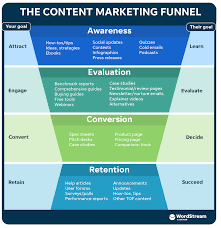Mastering the Art of Content Creation in Digital Marketing Strategies
The Power of Content Creation in Digital Marketing
In today’s digital age, content creation plays a crucial role in the success of any digital marketing strategy. With the increasing competition and noise in the online space, businesses need to create compelling and engaging content to capture the attention of their target audience.
Content creation is not just about producing text; it encompasses a variety of formats such as videos, infographics, podcasts, and more. By diversifying content types, businesses can reach a wider audience and cater to different preferences.
One of the key benefits of content creation in digital marketing is its ability to establish thought leadership and credibility. By sharing valuable and informative content, businesses can position themselves as industry experts and build trust with their audience.
Moreover, content creation is essential for improving search engine visibility. Search engines like Google value high-quality and relevant content, making it easier for businesses to rank higher in search results and drive organic traffic to their websites.
Another advantage of content creation is its role in nurturing leads and guiding them through the sales funnel. By creating targeted content that addresses the needs and pain points of potential customers at each stage of their journey, businesses can increase conversion rates and drive sales.
Furthermore, content creation allows businesses to engage with their audience on social media platforms and build a community around their brand. By sharing interesting and shareable content, businesses can increase brand awareness and foster relationships with customers.
In conclusion, content creation is a powerful tool in digital marketing that can help businesses achieve their goals, whether it’s increasing brand awareness, driving website traffic, or generating leads. By investing time and resources into creating valuable and relevant content, businesses can stay ahead in the competitive digital landscape.
The Crucial Role of Content Creation in Digital Marketing Success
Understanding Content Creation within the Digital Media Landscape
4. Kickstarting Your Journey in Digital Content Creation:
- What are examples of content creation?
- Why is content creation important in digital marketing?
- What is content creation in digital media?
- How do I start digital content creation?
- What does content creation mean in marketing?
- What is creating content in marketing?
What are examples of content creation?
In the realm of digital marketing, examples of content creation encompass a wide range of formats and mediums. Some common examples include blog posts, articles, social media posts, videos, infographics, podcasts, webinars, case studies, whitepapers, e-books, and email newsletters. Each type of content serves a specific purpose in engaging with the target audience and conveying valuable information or messages. By leveraging a mix of these content creation examples strategically, businesses can effectively communicate their brand story, showcase expertise, drive engagement, and ultimately achieve their digital marketing objectives.
Why is content creation important in digital marketing?
Content creation is paramount in digital marketing for several reasons. Firstly, it serves as a vehicle for businesses to communicate their brand message and values to their target audience effectively. Engaging and informative content can help businesses establish credibility, build trust with customers, and differentiate themselves from competitors. Additionally, content creation plays a crucial role in enhancing search engine visibility, driving organic traffic to websites, and improving overall online presence. By consistently producing high-quality content that resonates with their audience, businesses can nurture leads, boost conversions, and ultimately achieve their marketing objectives in the digital realm.
What is content creation in digital media?
Content creation in digital media refers to the process of developing and producing various types of content, such as articles, videos, images, infographics, and more, specifically for online platforms and channels. It involves creating engaging and relevant content that resonates with the target audience to attract, inform, entertain, or persuade them. Content creation in digital marketing aims to communicate a brand’s message effectively, build brand awareness, engage with the audience, drive traffic to websites or social media channels, and ultimately convert leads into customers. By crafting compelling content tailored to the online environment, businesses can enhance their online presence, establish authority in their industry, and achieve their marketing objectives in the digital space.
How do I start digital content creation?
To embark on digital content creation, it is essential to begin by defining your target audience and understanding their preferences and needs. Conduct thorough research to identify relevant topics that resonate with your audience. Develop a content strategy outlining the goals, formats, and distribution channels for your content. Invest in quality tools and resources to create engaging and visually appealing content. Consistency is key, so establish a regular posting schedule to keep your audience engaged. Monitor the performance of your content using analytics tools and adjust your strategy based on insights to continually improve and refine your digital content creation efforts.
What does content creation mean in marketing?
In the realm of marketing, content creation refers to the strategic process of developing and producing various forms of valuable and engaging content to attract, engage, and retain a target audience. Content creation in marketing involves crafting compelling messages, visuals, and multimedia assets that resonate with consumers and align with the brand’s objectives. This content is designed to inform, educate, entertain, or inspire the target audience while driving desired actions or behaviours that support the overall marketing goals of a business. Effective content creation in marketing is essential for building brand awareness, establishing credibility, nurturing customer relationships, and ultimately driving conversions and business growth in the digital landscape.
What is creating content in marketing?
Creating content in marketing refers to the process of developing and producing various forms of media, such as articles, videos, infographics, podcasts, and more, with the purpose of engaging and attracting a target audience. Content creation is a strategic approach that involves crafting compelling and valuable material that resonates with consumers, addresses their needs, and ultimately drives them to take desired actions. It plays a vital role in digital marketing by establishing brand identity, enhancing online visibility, building trust with customers, and ultimately driving business growth. Effective content creation requires a deep understanding of the target audience’s preferences, interests, and pain points to deliver relevant and impactful messages that cut through the digital noise.




